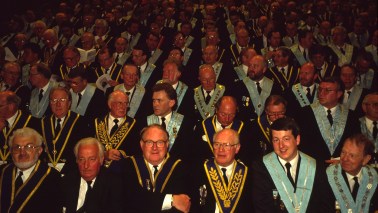I’m in Glasgow East for the day, making a short film of my column in the current Spectator for the BBC. We’ve just been in perhaps the most run down housing estate I have seen – there is a doll in the doorway next to a dead rat. Houses were boarded up, and you’d think it was condemned if it wasn’t for a postman making his way inside. It made it all the more appalling to see two kids stepping over this junk to go back home. I spoke to them briefly – twins, aged 12. They said it was okay on the estate, aside from the gang fighting on Fridays. Their complaint was that it there was nothing to do here. I asked why all the houses had been vacated. Vandalism, they said – people having their windows put in. The local pub here has no windows at all, just huge slabs of white concrete. At 11.30am it was doing brisk trade. It reminded me of the bomb defences I saw in Afghanistan. Because this is a warzone, here, in its own way.
Money is spent here – billions of it. Right next door to the sink estate, new houses were being built. It probably cost as much to build them as it did to build the abandoned old ones. Just a few streets away there is a spanking new arts centre, offering lattes and free bellydancing classes. There’s also a business centre, all gleaming wood and glass. You can just imaging politicians here, telling the cameras how regeneration is taking place. Green shoots of recovery, and the like.
Outside this centre I got speaking to a charity worker, who works with a group called Youth Involvement Project They used to work with 15-18 year olds, he said, but has gone further down the age scale to interrupt would-be delinquents. He now deals with children as young as eight. I asked how can you tell if you need to intervene. Simple: the kids, even then, get in trouble with the police for stealing or being involved in the set-piece gang battles. Their parents may be drug addicts. So they try to act in loco parentis. His group is funded by various government bodies: again, no shortage of funds. But for as long as half of this constituency is workless, with the rapid disintegration of civil society which that brings with it, there will be no shortage of children needing such care.
We filmed a shot outside the house my father was born in which is right in the middle of the constituency. It was stunning, the council – who built it in the 30s – have replaced the sheet metal with brick and it looks lovely. A reminder that there are many good, safe and even desirable houses in the constituency – and not just privately owned. In Mount Vernon, there are Victorian Terrace houses – the architecture of the west end, complete with the posh cars in the drive. That is a characteristic of Glasgow: a bewildering mosaic of deprivation next to prosperity.
Our final stop was a high rise tower block of flats next to Celtic Park. We were let in to film the view from an empty flat on the top floor. On the way in, we passed a man staggering by clutching a can of Special Brew and children behind him, calling him ‘dad’. Each child had two dogs. Lifts come seldom, so plenty piled on the one taking us to the 29th floor. We were joined by a chap who was clearly a drug user, he asked the cameraman how much his equipment cost. “A fair amount” he said. He then offered to “steal” it from him, and split the proceeds. He declined. This guy couldn’t have been any more than 20, yet he looked like a ghost. This was Parkhead South where life expectancy is 62 years (and falling). Life expectancy is higher in both Uzbekistan and Bangladesh.
As the cameraman was filming, I got chatting to one of the guys who works in the housing estate. Its one of those conversations I will remember for a while, and I wrote it down afterwards. This is what’s in my notes, and its worth repeating in full. “I’m glad you didn’t come filming half an hour earlier when the sun was shining, because this foul weather sums up East Glasgow. I read in the newspapers that unemployment here is 10 percent but I think half the people are on welfare. (He’s right, it’s 49.7 percent when you include incapacity benefit). “I know some lads who signed on the disability allowance, they did so because they injected themselves in the leg so often they couldn’t walk properly. So we sign them up to a short life of drug addiction, and they steal to finance it. But the unemployment here is in its 3rd and 4th generation. What’s a kid to learn, growing up seeing the parents do nothing, except maybe a bit of drugs? I had an asylum seeker living here, a doctor, who wanted to work aged 70. They wouldn’t let him, and he didn’t understand. There are kids here who don’t want to work aged 17. No wonder, because the invalidity benefit makes it possible for them. The system doesn’t work”.
There are two more weeks of Glasgow East, and as The Times says today in its superb leader this is a rare opportunity to put British poverty under the microscope. My film should go out on the Daily Politics on Thursday, but will last just five minutes or so – and its just me speaking. Spend just a few minutes in the welfare ghettoes here, and you see the “great evil” of idleness at work. It is being mass produced by the very welfare system designed to eradicate it. This is the lesson of Glasgow East.






Comments